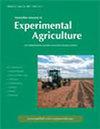Nutritional management for enteric methane abatement: A review
引用次数: 1030
Abstract
A variety of nutritional management strategies that reduce enteric methane (CH4) production are discussed. Strategies such as increasing the level of grain in the diet, inclusion of lipids and supplementation with ionophores (>24 ppm) are most likely to be implemented by farmers because there is a high probability that they reduce CH4 emissions in addition to improving production efficiency. Improved pasture management, replacing grass silage with maize silage and using legumes hold some promise for CH4 mitigation but as yet their impact is not sufficiently documented. Several new strategies including dietary supplementation with saponins and tannins, selection of yeast cultures and use of fibre-digesting enzymes may mitigate CH4, but these still require extensive research. Most of the studies on reductions in CH4 from ruminants due to diet management are short-term and focussed only on changes in enteric emissions. Future research must examine long-term sustainability of reductions in CH4 production and impacts on the entire farm greenhouse gas budget.肠道甲烷减排的营养管理:综述
各种营养管理策略,减少肠道甲烷(CH4)的生产进行了讨论。农民最有可能采取诸如增加饲粮中谷物含量、添加脂质和补充离子载体(> - 24ppm)等策略,因为这些策略除了提高生产效率外,还极有可能减少甲烷排放。改善牧场管理、用玉米青贮代替草青贮和使用豆类对减少甲烷有一定的希望,但其影响尚未得到充分的记录。一些新的策略,包括膳食中添加皂苷和单宁,选择酵母培养物和使用纤维消化酶,可能会减轻CH4,但这些仍需要广泛的研究。大多数关于饮食管理导致反刍动物甲烷减少的研究都是短期的,并且只关注肠道排放的变化。未来的研究必须考察甲烷产量减少的长期可持续性以及对整个农场温室气体预算的影响。
本文章由计算机程序翻译,如有差异,请以英文原文为准。
求助全文
约1分钟内获得全文
求助全文

 求助内容:
求助内容: 应助结果提醒方式:
应助结果提醒方式:


